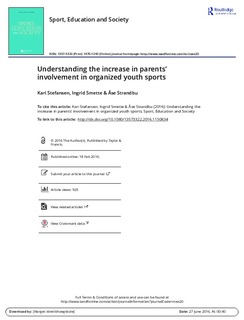| dc.contributor.author | Stefansen, Kari | |
| dc.contributor.author | Smette, Ingrid | |
| dc.contributor.author | Strandbu, Åse | |
| dc.date.accessioned | 2016-06-29T11:45:15Z | |
| dc.date.available | 2016-06-29T11:45:15Z | |
| dc.date.issued | 2016-02-18 | |
| dc.identifier.citation | Sport, Education and Society. 2016, under utgivelse. | nb_NO |
| dc.identifier.uri | http://hdl.handle.net/11250/2394692 | |
| dc.description | © 2016 The Author(s). Published by Taylor & Francis.
This is an Open Access article distributed under the terms of the Creative Commons Attribution-NonCommercial-NoDerivatives License (http://creativecommons.org/Licenses/by-nc-nd/4.0/), which permits non-commercial re-use, distribution, and reproduction in any medium, provided the original work is properly cited, and is not altered, transformed, or built upon in any way.
Permission is granted subject to the terms of the License under which the work was published. Please check the License conditions for the work which you wish to reuse. Full and appropriate attribution must be given. This permission does not cover any third party copyrighted material which may appear in the work requested. | nb_NO |
| dc.description.abstract | As part of an ethnographic study on young people and learning (the knowledge in motion across contexts of learning project, set in Norway), we interviewed a diverse sample of parents of young teenagers, many of whom were active in organized sports. The parents described their level of involvement in sport in a way that contrasted sharply to our own experiences participating in youth sports in the 1970s and 1980s. Back then most parents were absent from the sports fields. This new role of sports in the practice of parenthood is what we investigate in this study. The purpose is to further the understanding of the cultural processes that drive what we see as a marked generational change in the relationship between organized sports and the practice of parenthood. In contrast to previous studies, we also focus on the relationship between generational change and classed patterns in parenting. Our data suggest that across social classes, parents see involvement in sports as normal, and as a way to connect to the child emotionally and to further the child's development. We interpret the significance of sports in the parent–child relationship as related both to the normalization of youth sports that the parents experienced when they grew up, and to the new cultural ideas of parenthood that they encounter as adults. We find that there are tensions embedded in this new form of parenthood that are particularly evident in what we call ‘deep involvement’, an intensified form of parental engagement with youth sports that is practiced primarily by fathers in the economic fraction of the middle class. We conclude that the new role of sport in the practice of parenthood is a classed as well as a generational phenomenon. | nb_NO |
| dc.language.iso | eng | nb_NO |
| dc.publisher | Routledge | nb_NO |
| dc.subject | youth | nb_NO |
| dc.subject | organized sports | nb_NO |
| dc.subject | parenthood | nb_NO |
| dc.subject | social class | nb_NO |
| dc.subject | generation | nb_NO |
| dc.subject | cultural change | nb_NO |
| dc.subject | cultivation | nb_NO |
| dc.subject | Norway | nb_NO |
| dc.title | Understanding the increase in parents’ involvement in organized youth sports | nb_NO |
| dc.type | Journal article | nb_NO |
| dc.type | Peer reviewed | nb_NO |
| dc.subject.nsi | VDP::Social science: 200 | nb_NO |
| dc.subject.nsi | VDP::Social science: 200::Social science in sports: 330 | nb_NO |
| dc.subject.nsi | VDP::Social science: 200::Social science in sports: 330::Other subjects within physical education: 339 | nb_NO |
| dc.source.journal | Sport, Education and Society | nb_NO |
| dc.identifier.doi | 10.1080/13573322.2016.1150834 | |
| dc.description.localcode | Seksjon for kultur og samfunn / Department of Cultural and Social Studies | nb_NO |
